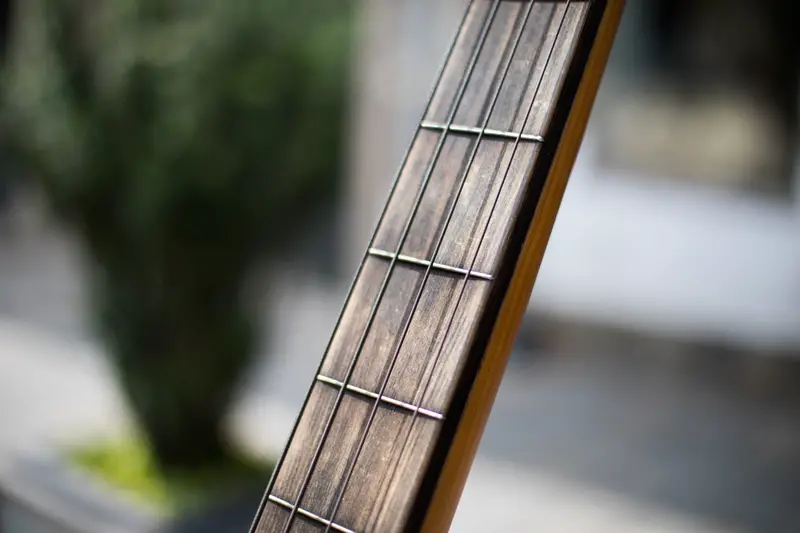The hands are one of the dirtiest parts of the human body. Our fingers touch hundreds, if not thousands, of surfaces, animals, and other humans every single day. We rub our eyes, pick our nose, scratch our butts, touch our food, and even put them in our armpits when cold. Even if we wash them often, they still get pretty grody. Guitarists also spend a lot of time with their acoustic guitars in their hands so the debris and refuse that gets on our hands, ends up in and on our guitar strings and fretboards.
Cleaning an acoustic guitar fretboard is a fairly simple task that should be done every time you change your strings.
With the strings off your acoustic guitar, clean your guitar fretboard by wiping the fretboard with a rag dampened with warm water or a quality mineral oil and then wipe clean with a dry, clean rag. For heavy buildup, use an old toothbrush, steel wool or even a razor blade.
Make sure any oil you use is approved for the type of wood your fretboard is constructed from (especially if it is maple) and never scrape or use steel wool on a painted or finished fretboard. There are several different types of woods, stains and finishes for fretboards. Make sure you are familiar with the materials your acoustic guitar fretboard was constructed with before using anything other than a damp rag on your fretboard. Certain types of woods and finishes can be easily damaged by oil or scraping.
How to clean an acoustic guitar fretboard
 The human body is a messy organism that creates and expels fluids, dander, and other waste. It has been estimated that every cell in the human body will be replaced an average of 11 times over the average human lifespan. Some cells get replaced every few days, others last our whole lives. In general we do not end our lives with the same cells we started with and many of those cells end up on our acoustic guitar fretboards.
The human body is a messy organism that creates and expels fluids, dander, and other waste. It has been estimated that every cell in the human body will be replaced an average of 11 times over the average human lifespan. Some cells get replaced every few days, others last our whole lives. In general we do not end our lives with the same cells we started with and many of those cells end up on our acoustic guitar fretboards.
Added to our cellular castoffs are those we pick up from other people and pets in our dwellings, dust, cigarette or vape smoke, resin, etc. This will end up on our acoustic guitars and get ground into the strings and fretboard. A routine of wiping down your strings before and after you play helps mop up the majority of the debris on our acoustic guitars and keeps it from accumulating on the fretboard. But over time the gack will start to build up and become noticeable. For the most part it comes off fairly easily and fretboard cleaning should be performed every time you change your strings. It is pretty senseless to put new strings on your acoustic guitar only to start pressing those bright new strings right into the gack you left on your fretboard.
For light/routine acoustic guitar fretboard cleaning you will need:
- Warm water or fretboard conditioner (if your fretboard is unfinished maple, please read all warnings)
- Two clean cloths
Steps for lightly cleaning your acoustic guitar fretboard:
- Remove the strings.
- Wet one cloth with warm water or fretboard conditioner.
- If using water, wring as much water out of the cloth as possible.
- Wipe the fretboard thoroughly between and up against every fret.
- Frequently move to a new spot on the rag as it gets soiled.
- Frequently use the other cloth to dry any water or excess oil that remains on the fretboard as you clean it. (Water left on the fretboard can damage the wood. Further, older instruments may not have stainless steel frets and can rust)
When you are satisfied with how clean the fretboard on your acoustic guitar is, you can follow up by wiping it down with a quality lemon oil, mineral oil or other fretboard conditioner and then restring with your favorite new strings.
Personally, I like Dr. Stringfellows Lem-Oil and have used it almost exclusively for 25 years without issue. There are many fretboard conditioners available and most are simply mineral oil which are safe for use on ebony, rosewood, and lacquered fretboards. If used on a lacquered fretboard be sure to wipe it off thoroughly as the oils will not be absorbed by the wood. To reiterate, they are not safe to use on unfinished maple fretboards. Also, do not use food-based oils (olive/walnut/canola etc) since they can go rancid over time.
It is not necessary to apply an oil to the fretboard. However, it helps keep future debris from adhering to the wood and it conditions the wood, preventing it from drying out. When wood dries, it shrinks and can cause the frets to loosen over time or the fret ends will begin to protrude from the edge of the fretboard.
If you’ve neglected a cleaning routine or eat a lot of Cheetos and your acoustic guitar fretboard has accumulated heavier debris that won’t simply wipe off, addressing this issue is still fairly simple.
 For heavier acoustic guitar fretboard cleaning, you will need one or more of the following:
For heavier acoustic guitar fretboard cleaning, you will need one or more of the following:
- Toothbrush, dry cloth and warm water
- Triple or four aught (000, 0000) steel wool
- Razor blade (Warning: razor blades are really, really, really sharp. Use caution and care)
Only use a razor blade where the debris is located. It is not necessary to clean the whole fretboard in this manner. Steel wool is fairly abrasive and should not be used on fretboards that have been stained or painted. If you use steel wool on a lacquered fretboard, be careful to not ‘sand’ through the finish. Steel wool will dull the finish and it will need to be polished again when you are done cleaning. This can be accomplished with fine micro-mesh and lacquer polish. I recommend using an old, soft toothbrush for lacquered fretboards.
 Steps for cleaning heavier debris from your acoustic guitar fretboard:
Steps for cleaning heavier debris from your acoustic guitar fretboard:
- Always work in the direction of the wood grain.
- Tear off a half-dollar sized chunk of steel wool and rub the steel wool on the area of debris until it is removed, or
- Dip a toothbrush in warm water, shake out as much water as possible and scrub the area with the toothbrush. Immediately dry the area with a clean, dry cloth.
- For really stuck on debris, use a razor blade held parallel to the frets (and 90 degrees to the fretboard) to lightly scrape across the offending debris area until it is removed.
When satisfied, wipe the fretboard down with a clean dry cloth and then apply a lem-oil, mineral oil or fretboard conditioner.
What can I use to clean my ebony fretboard?
Ebony is a popular fretboard wood on most types of stringed instruments including acoustic guitars, because it is a very hard, dense, and durable wood. It doesn’t need a finish to shine and it also lends itself to faster playing. Because it is so dense it naturally has water repellent properties (fun fact: it doesn’t float) and can be cleaned with water on a damp cloth, fretboard conditioners, or light scraping. It also doesn’t have a lot of open grain that gack and debris can accumulate in.
Can I use rubbing alcohol to clean my fretboard?
Nope. Do not use rubbing alcohol/isopropyl alcohol or ammonia to clean your fretboard. These items can stain and dry out the wood on your fretboard. If your fretboard is lacquered, alcohol will degrade and eventually eat away at the lacquer.
Any debris that can’t be removed with steel wool, a toothbrush, or a razor blade will not likely get removed by isopropyl alcohol or ammonia either. If your fretboard has something on it that can’t be removed by any of the aforementioned steps you need to go see your favorite luthier and have them address the issue. They probably miss seeing you anyway.
Keeping a dedicated routine of wiping your strings down before and after you play will help keep debris from building up on your fretboard. By maintaining this routine, your fretboard will be much easier to clean and will not likely require heavier, more abrasive cleaning methods that are more time consuming and carry the possibility of damaging your fretboard.



